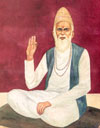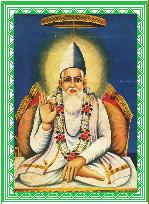 Kabir (1440 – 1518) Indian Bhakti poet Kabir (1440 – 1518) Indian Bhakti poet
“The river that flows in you also flows in me.” – Kabir |
Selected Poems of Kabir
- The Bhakti path
- O servant where dost thou seek me
- O friend
- Do not go to the garden of flowers
- Tell me brother
- The Swan Flies away
- Abode of the Beloved
- I said to this wanting creature inside me
- Within this Earthen Vessel
- View: Songs of Kabir by Rabindranath Tagore
- View: Kabir poems
Kabir Versions by Daniel Ladinsky
Biography of Kabir
Many legends abound about the birth, life and death of Kabir, one of India’s most quoted  poets and mystics. His birth itself is shrouded in mystery, some say he was the son of a Brahman widow, others that he was of virgin birth, what is known though is that he was brought up in a family of Muslim weavers. He was never formally educated and was almost completely illiterate. According to legend, the only word that he ever learned how to write was “Rama”.
poets and mystics. His birth itself is shrouded in mystery, some say he was the son of a Brahman widow, others that he was of virgin birth, what is known though is that he was brought up in a family of Muslim weavers. He was never formally educated and was almost completely illiterate. According to legend, the only word that he ever learned how to write was “Rama”.
‘Listen to me brother! bring the
vision of the Beloved in your heart’
– Kabir
Legend says that he relinquished his body when he was about 120 years old. There is a famous legend about his death; When he died, his Hindu and Muslim followers started fighting about the last rites. When they lifted the cloth covering his body, they found flowers instead. The Muslim followers buried their half and the Hindu cremated their half. In Maghar, his tomb and samadhi still stand side by side.
Kabir Das (kabir, Arabic for “great”, dasa, Sanskrit for “slave” or “servant”) was born in the year 1398 AD, 71 years before Guru Nanak. He is one of the medieval Indian saints of the Bhakti and Sufi movement whose compositions figure in Sikh Scripture, the Guru Granth Sahib.
From among all of them, Kabir’s contribution is the largest. Kabir lived in a time of great political upheaval in India. Kabir’s life was centred around Kashi, also called Banaras (Varanasi). Legend has it that he was actually the son of a Brahmin widow who abandoned him and that he was found by a Muslim weaver named Niru, who adopted the boy and taught him the weaver’s trade.
Kabir through his couplets not only reformed the mindset of common villagers and low caste people but gave them self-confidence to question Brahmins. Kabir believes in self-surrender and God’s bhakti. He suggests inward worship and remembrance of God. For him, true worship is only inwards.
Kabir composed no systematic treatise, rather his work consists of many short didactic poems, often expressed in terse vigorous language in the form of Padas, Dohas, and Ramainis (forms of poetry in Indian languages).
